How and how to feed eggplants in a greenhouse?
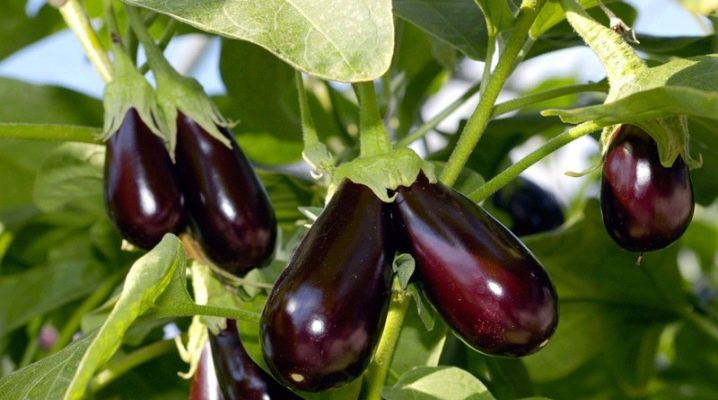
Eggplant is a demanding crop that needs special care and regular feeding. You can feed the bushes growing in a modern greenhouse with both commercial and organic products. The main thing is that plants receive all the substances they need for growth and development.
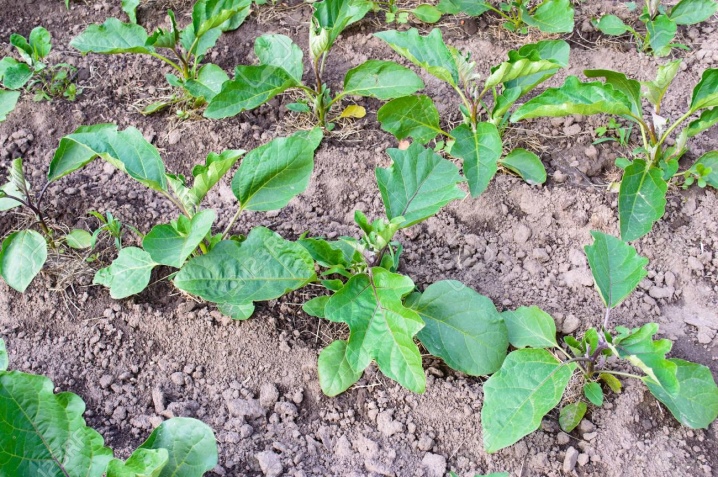
The need for a procedure
Feeding eggplants in a polycarbonate greenhouse allows you to improve the condition of plants at various stages of development. In the first days after planting, the bushes are fertilized so that they grow more actively. During the budding period, they are fed to increase the number of ovaries. After the fruits appear, the bushes are fertilized in order to improve their taste, as well as to make the eggplants more mature.
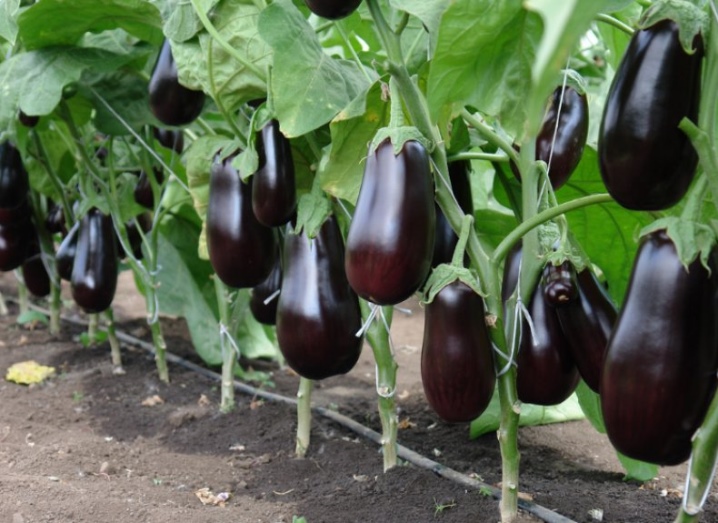
These plants need the following nutrients.
- Nitrogen... With its lack, "blue" grow very slowly. The bushes remain weak and pale for a long time. Very few ovaries are formed on them. If the gardener "overfeeds" the plants with nitrogen-containing fertilizers, they begin to actively increase the green mass. But this is not at all good for them, because because of this, the plant throws out fewer flowers. Therefore, the eggplant yield decreases.
- Potassium... This element makes plants stronger and more capable of adapting to temperature changes faster. Determining a potassium deficiency is fairly straightforward. The foliage of the plants begins to stretch upward, the ovaries and flowers fall from the bushes. In addition, dark spots may appear on the foliage. Having noticed such signs, the bushes should be fed with any fertilizer that contains potassium.
- Phosphorus... The use of dressings that contain this element accelerates the process of fruit ripening. If the plant lacks phosphorus, the "blue" ones slow down their growth. In addition, the fruits still remain small after ripening.
Apart from these essential elements, eggplant also needs manganese, boron and iron. If the bushes do not have enough of them, the foliage becomes more lethargic, turns yellow and dries up. All this negatively affects not only the condition of the bushes, but also the taste of the fruit.
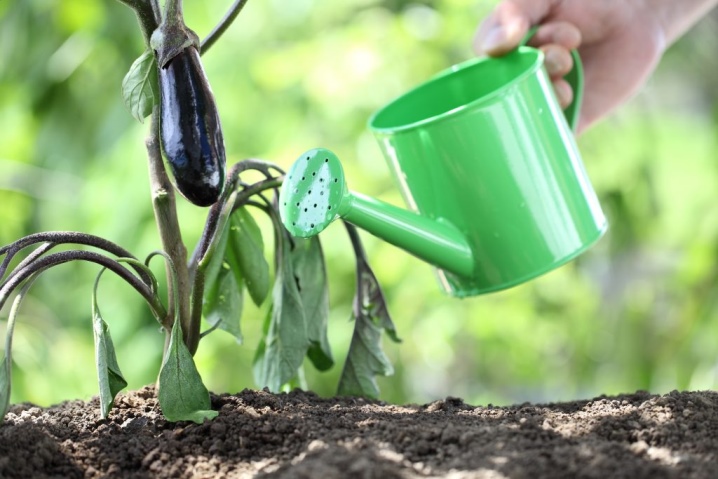
Fertilizer overview
You can use different fertilizer options to feed eggplant beds.
Mineral
Such dressings are suitable for both beginners and experienced gardeners. Eggplants are preferred to fertilize with the products listed below.
- Ammonium nitrate... It is one of the most popular nitrogen fertilizers. Its use has a great effect on the condition of foliage and ovaries. Therefore, it is used if the bushes grow poorly.
- Urea... The use of urea also helps to speed up the growth of the bushes. It is recommended to dilute it in warm water before use.
- Ammonium sulfate. This remedy is used mainly in the spring. It contains a large amount of nitrogen. This product can be mixed well with manure. It is worth preparing such a top dressing immediately before applying it to the soil.
- Potassium nitrate... This ingredient is commonly used in the flowering process. It contains not only potassium, but also a small amount of nitrogen. Therefore, it is not worth using it for feeding green plants during the fruiting period.
- Superphosphate... This top dressing should be used for soil cultivation only if it is not too acidic. It is recommended to introduce it at the later stages of plant development.
In order not to harm the bushes, you need to apply dressings carefully, without violating the dosages.
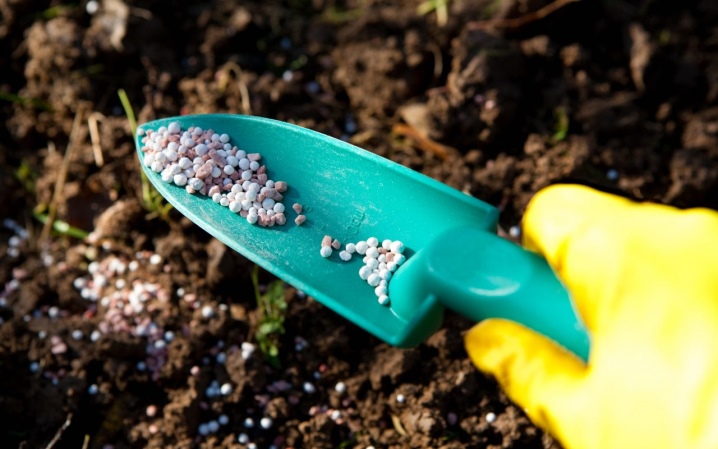
Organic
The use of organic fertilizing has a positive effect on the condition of the bushes. Such formulations also improve the quality of the soil. You can feed the plants with the following fertilizers.
- Manure... Rotted manure is used for processing the site. It is mixed with water in a ratio of 1 to 10. After mixing the ingredients, the container with the future feeding is sent to infuse for several days. It is worth adding this product only by foliar method.
- Bird droppings. This fertilizer "blue" also love. For its preparation, the product is diluted in a ratio of 1 to 20. Immediately after preparation, the solution is also sent to a dark place for 7 days.
- Herbal infusion. At the heart of this top dressing is manure or chicken. The selected product is diluted with water, and then finely chopped weeds are added to the container. A small amount of dry ash can also be added there. It is diluted in water in the same proportions as the chicken. Insist on such a product for a week. Before use, the solution is certainly diluted.
These simple dressings are usually applied to the garden beds in the first half of the season.
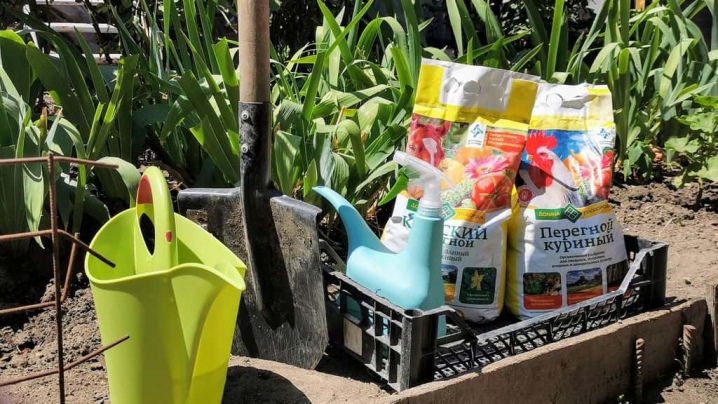
Special drugs
Suitable for feeding eggplants and complex fertilizers... The most popular products used to fertilize shrubs in a greenhouse are "Kemira" and "Ideal"... They contain all the nutrients that plants need for normal growth and development.
Like conventional mineral fertilizers, complex fertilizers must be used carefully. It is very important to observe the dosage so as not to harm the plants. An overabundance of nutrients negatively affects the condition of the bushes.
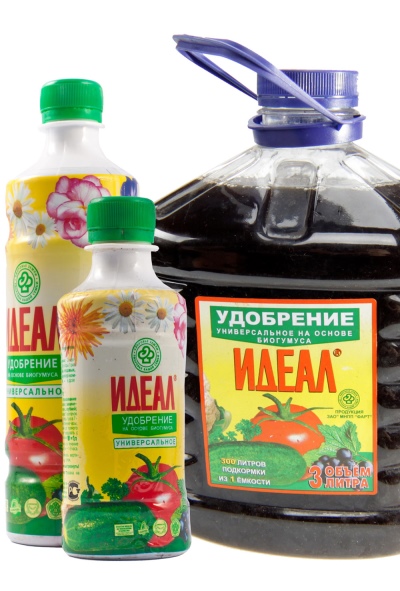
Folk remedies
Gardeners who prefer to grow vegetables in their area without "chemistry" often use various folk remedies to process plants. The following products are best suited for fertilizing eggplants in a greenhouse.
- Pure ash... Many plants are fed with this product. For the preparation of various dressings, ash left after burning branches and foliage is usually used. It is introduced into the soil both dry and as part of a solution. To obtain the latter, 500 grams of ash are diluted in a bucket of warm and well-settled water. The composition is infused for a day. After that, it needs to be filtered. The resulting fertilizer is used for treating bushes in its pure form. If the plants need to be fed on a leaf, you need to use twice as much water to prepare the solution.
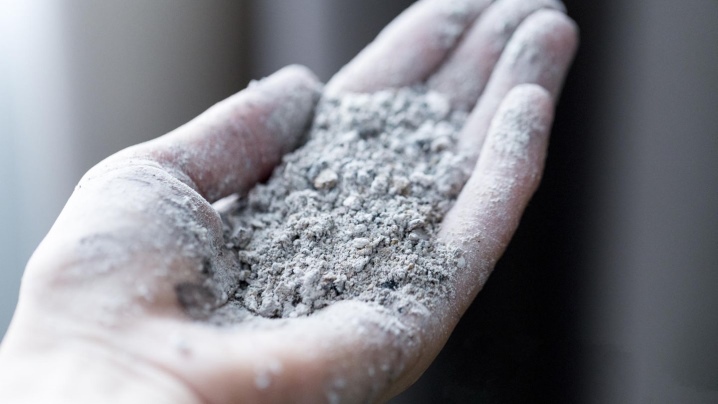
- Iodine... This is another affordable product that you can buy at any pharmacy. A solution based on this product saturates the soil with useful trace elements, and also protects plants from common diseases and pests. Preparing such a remedy is very simple. Only a few drops of iodine are added to a bucket of water. The resulting product is used for watering plants directly at the root. Spraying the bushes with such a product will lead to burns on the foliage.
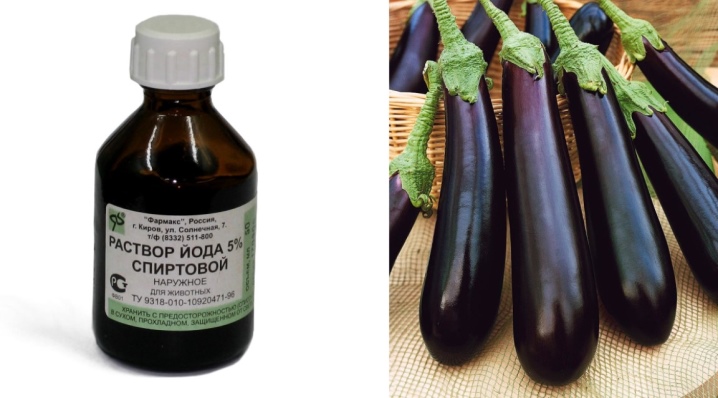
- Yeast... Raw yeast is most commonly used to process eggplant. A kilogram of the product is diluted in five liters of water. It should definitely be warm. The container with the resulting solution is left in a warm place for a day. It is diluted before use. If there is no time to prepare such a solution, the gardener can use dry yeast to prepare the fertilizer. A bag of such a product is diluted in a bucket of warm water. To enhance the effect, a little sugar is also added to the container. The product is infused for two hours. Yeast fertilizers can be used no more than twice during the whole season. It is worth making such dressings only if the room is warm enough.
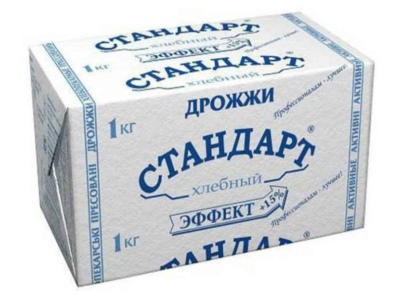
- Banana skins. Banana skins can be used to feed your plants to get enough potassium. They need to be placed in a container of water.It is necessary to infuse the product within 2-3 days. After that, the fertilizer must be filtered and used to feed a small area with eggplants.
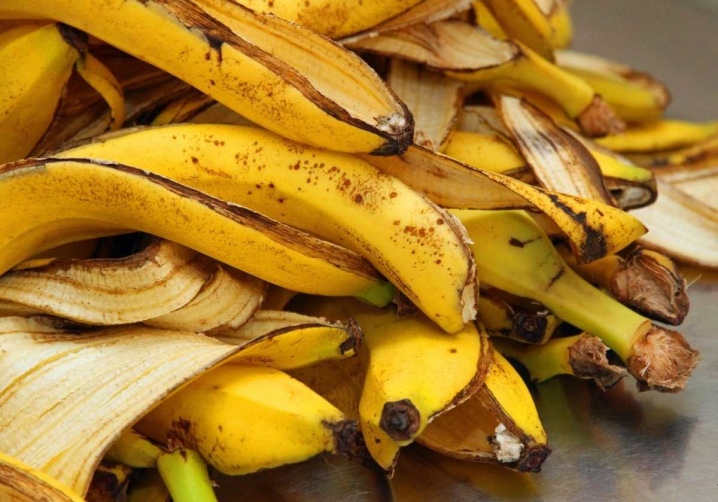
- Herbal infusion. For cooking, you can use any weeds. A kilogram of greenery is poured with 20 liters of water. Sometimes half a glass of dry ash is added there. The resulting mixture is infused for 8-9 days. After that, the composition is used for watering plants at the root. Foliar top dressing with such a tool should not be carried out.
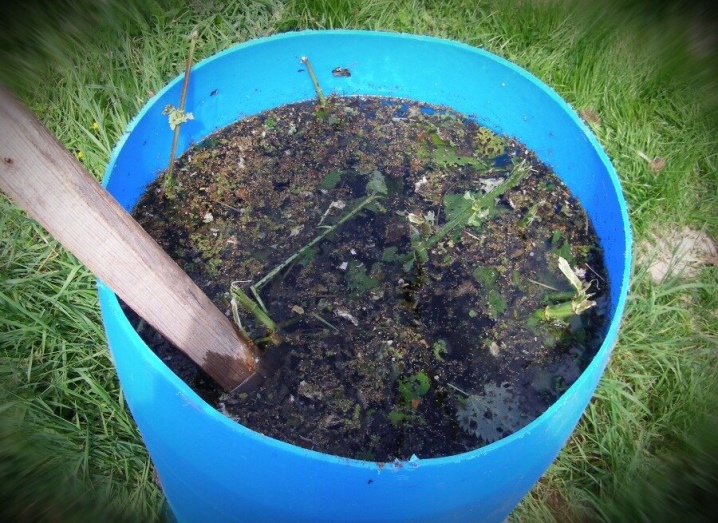
- Compost tea... This remedy helps to restore weakened plants very quickly. For its preparation, the barrel is filled with fresh compost by a third. Then clean water is poured into the container. The contents of the barrel are mixed. After that, it is left in a warm place for 4-6 days. From time to time, the composition must be stirred. Strain it before using it. Liquid top dressing is used for root watering immediately after preparation.
All these dressings are time-tested. Therefore, there is no doubt about their effectiveness.
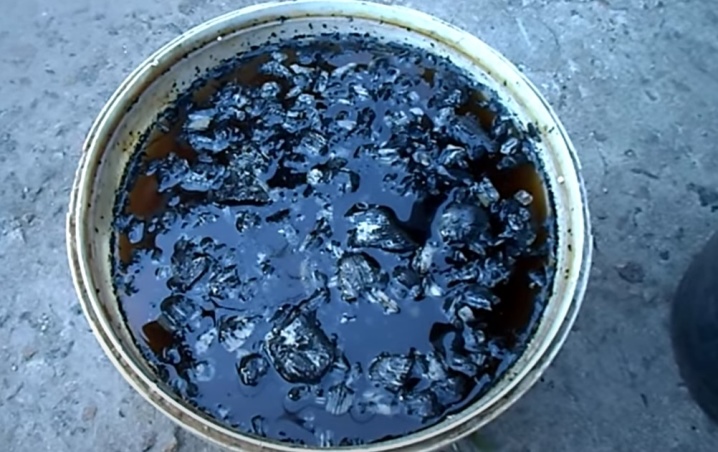
Application stages
As a rule, when making various dressings, gardeners are guided by the phases of plant development. On average, eggplants are fed three times per season.
- After disembarking at a new site. The first feeding is carried out two weeks after transplanting green seedlings into the beds. Previously, fertilizing is not worth it, because at this time the roots of young eggplants have not yet had time to adapt to new growth conditions. At this stage, the bushes are treated with complex fertilizers. Best of all, young green plants perceive foliar feeding.
- Before flowering. In order for ovaries to form on the bushes faster, eggplants also need to be fertilized. For this purpose, fertilizing with potassium and phosphorus is used. The second should be added no earlier than 10 days after the first.
- During fruiting. During fruit formation, the bushes also need phosphorus. They also need potassium. The use of such fertilizers can significantly improve the quality of the fruit.
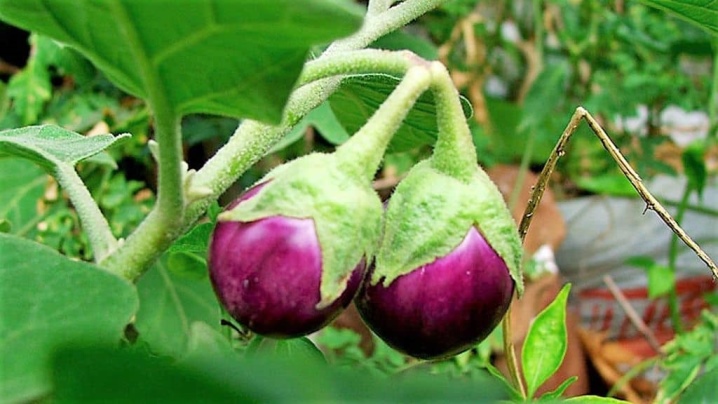
Using this simple scheme, you can provide plants with everything they need for normal development. If the bushes grow in an area with poor soil, you will have to feed the eggplants more often. This will need to be done, focusing on the appearance of young plants.
If you do everything right, eggplants will grow well and delight the owners of the site with large and tasty fruits.
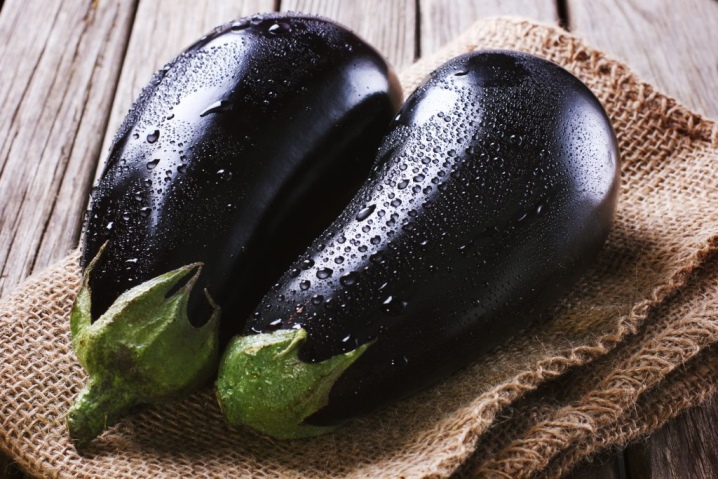






The comment was sent successfully.